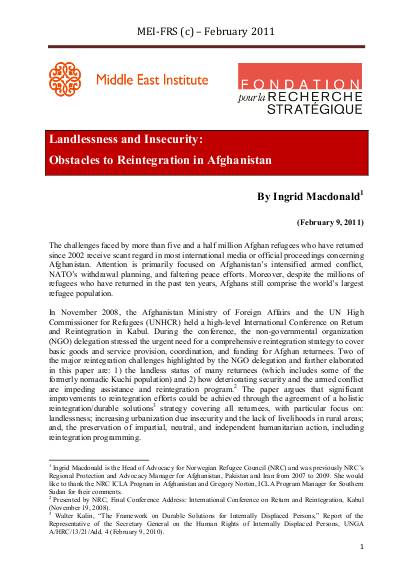
The challenges faced by more than five and a half million Afghan refugees who have returned since 2002 receive scant regard in most international media or official proceedings concerning Afghanistan. Attention is primarily focused on Afghanistan’s intensified armed conflict, NATO’s withdrawal planning, and faltering peace efforts. Moreover, despite the millions of refugees who have returned in the past ten years, Afghans still comprise the world’s largest refugee population.
In November 2008, the Afghanistan Ministry of Foreign Affairs and the UN High Commissioner for Refugees (UNHCR) held a high-level International Conference on Return and Reintegration in Kabul. During the conference, the non-governmental organization (NGO) delegation stressed the urgent need for a comprehensive reintegration strategy to cover basic goods and service provision, coordination, and funding for Afghan returnees. Two of the major reintegration challenges highlighted by the NGO delegation and further elaborated in this paper are: 1) the landless status of many returnees (which includes some of the formerly nomadic Kuchi population) and 2) how deteriorating security and the armed conflict are impeding assistance and reintegration program.2 The paper argues that significant improvements to reintegration efforts could be achieved through the agreement of a holistic reintegration/durable solutions3 strategy covering all returnees, with particular focus on: landlessness; increasing urbanization due insecurity and the lack of livelihoods in rural areas; and, the preservation of impartial, neutral, and independent humanitarian action, including reintegration programming.
Resource collections
- Topics
- UN Habitat - Urban Response Collection
- Urban Response - Urban Crisis Preparedness and Risk Reduction
- Urban Response Collection - Community Engagement and Social Cohesion
- Urban Response Collection - Economic Recovery
- Urban Response Collection - Environment and Climate Change
- Urban Response Collection - Housing, Land and Property
- Urban Response Collection - Urban Crisis Response, Recovery and Reconstruction
- Urban Response Collection - Urban Resilience
